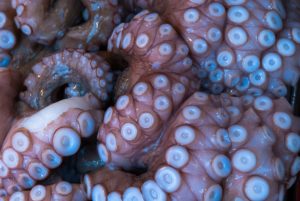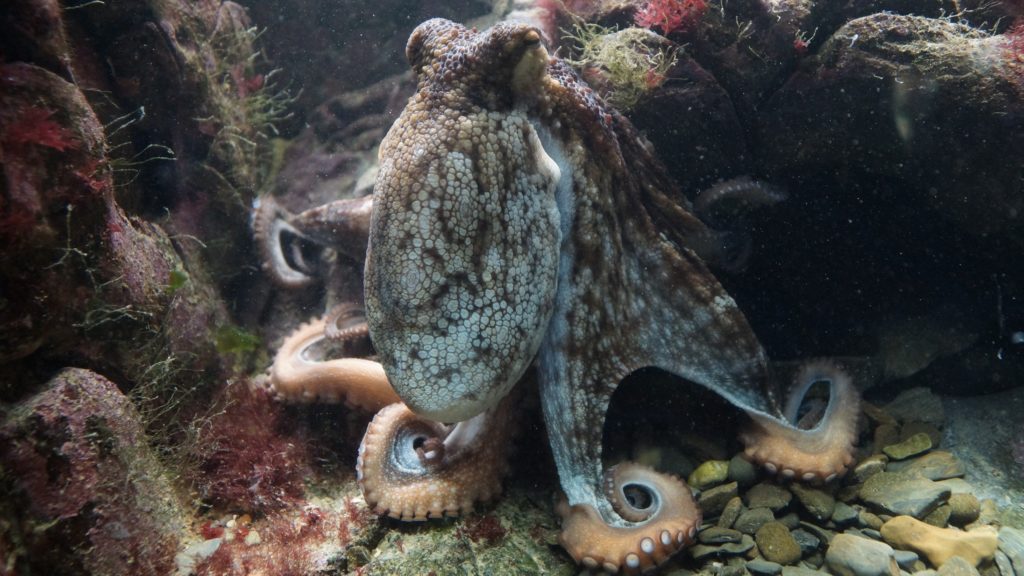An Octopus is as Smart as a 3-year old
How do we unbiasedly define intelligence? What does it mean to be sentient? Have a consciousness? And how do we draw the lines?
Humans have been denying, ignoring, falsifying, shying away from and tip-toeing around the intelligence of non-human animals since we decided to “civilize” and separate ourselves from the Natural World, but the Octopus is pulling apart our belief system on intelligence and challenging our understanding of consciousness itself.
The truth is, an octopus is as smart as your Labrador retriever or 3 year-old child. Yes, a blob of slimy, rubbery, sticky legs is demonstrating the “defined” characteristics of intelligence.
Though a member of the Mollusca phylum with clams and mussels, the octopus is classified as a Cephalopod (seffa-luh-pod) and unlike its mollusk relatives, octopuses have a centralized brain. Two areas of their brain are specialized for short and long-term memory, other areas are dedicated to learning.
Proven in studies, octopuses can recognize and either like or dislike individual humans, remembering them even if they haven’t seen them in months. The people they don’t like, often get a shot of water from their siphon in the face. They have unique personalities, can navigate simple mazes using visual cues to achieve their goals, they solve puzzles, form mental maps, demonstrate foresight and planning, evaluate situations, use tools and do things for fun. Octopuses play. And to be considered conscious, a requirement is that one must perform novel acts beyond routine or instinct.
I’m pretty sure, turning on lights by directing jets of water over and over isn’t an act of instinct, just as, plugging up tanks to flood aquariums or squirting butterflies in the air for no apparent reason is beyond routine. Octopuses have also figured out how to blow on objects back and forth, as if playing with a ball, and that’s definitely, “a novel act,” as is decorating their dens.
An Octopus Enrichment Handbook has even been written to help aquarium staff keep their octopuses minds engaged, because perhaps they need to play. Maybe next time you visit the aquarium, donate a Mr. Potato Head or the latest Lego set to the resident octopus. (And by the way, I didn’t make this up, Aquariums do supply these toys!)
Octopuses have been known to escape their tanks to eat a crab or fish in an adjacent tank and then return to their own tanks before anyone notices. They have been observed carrying around coconut shells to arrange later as a makeshift shelter and can open a child proof pill bottle, which come on, many adult humans can’t even do.
 Humans like to pride ourselves over our thumb and forefinger pincer grasp, setting us apart from other animals and helping us to claim it’s why we can manipulate the environment so well, but octopuses can fold the two sides of their suckers together and can grasp just like we can, and they have hundreds of suckers compared to our 4 digits. Octopuses want to know about everything around them, something many humans don’t even do.
Humans like to pride ourselves over our thumb and forefinger pincer grasp, setting us apart from other animals and helping us to claim it’s why we can manipulate the environment so well, but octopuses can fold the two sides of their suckers together and can grasp just like we can, and they have hundreds of suckers compared to our 4 digits. Octopuses want to know about everything around them, something many humans don’t even do.
Not only can an octopus change its color and texture instantaneously to communicate, shapeshift into any form, see with the same type of “camera eye” as we do, it has three hearts, blue blood, can squirt ink, move with jet-like propulsion and regenerate limbs, but the majority of their 500 million neurons are in their arms, which can touch, smell and taste. It is not clear where their brain begins and ends. Studies are even suggesting that octopuses may be able to see with their skin.
They are the world’s greatest multitaskers. They essentially have 8 brains and can focus on many simultaneous efforts, unlike humans, who are scientifically proven to be terrible multitaskers, yet are continually encouraged to do so.
My naturalist mentor taught me to look at animals as my teachers, to discover not only their unique gifts, but to learn what they had to teach me about myself and my relationship with the world. I think the octopus teaches about opening our minds to new concepts of intelligence, of perhaps a unfathomable, sensory intelligence. An octopus’ body is not a separate thing controlled by a brain or nervous system, it is whole.
In becoming wild, we must stop setting ourselves apart. Humans have had their identity tied up in our brain for millennia and it’s time to stop fearing the intelligence and sentient qualities of other animals. This will force us to continually change the way we care and interact with animals and plants, because the truth is, we’re not unique, separation only gives us permission to ignore our morals and exploit and disrespect creatures like the villainized, eight- armed “devil fish.”
To check out the video that accompanies this post, check out my Youtube Channel Becoming Wild: Click Here
Here are some great books about Octopuses:
The Soul of an Octopus by Sy Montgomery
Other Minds: The octopus, the sea and the deep origins of consciousness by Peter Godfrey-Smith
The Octopus and the Orangutan: New Tales of animal intrigue, intelligence and ingenuity byEugene Linden


Sorry that the octopus was eaten. Sea Lion?
How can I order one of the octopius ski hats you are wearing?
Yes, I’m always sad to see an octopus die. Sea lions definitely eat them, it very well could have been. I didn’t see eagles eating on it in the morning either. It will probably stay a mystery. I bought the hat in the Stubbs Island gift shop in Telegraph cove on vancouver island. I wish i had bought two! They are closed now, but they may have someone answering the phone and may know. Good luck. If i ever see them again I will let you know.